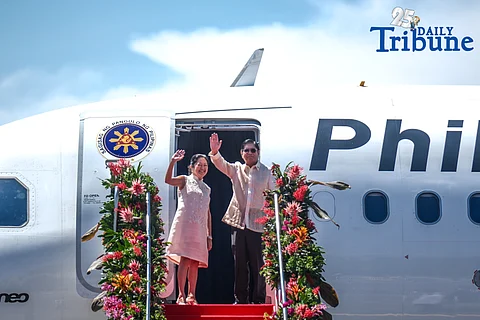
- NEWS
- the EDIT
- COMMENTARY
- BUSINESS
- LIFE
- SHOW
- ACTION
- GLOBAL GOALS
- SNAPS
- DYARYO TIRADA
- MORE

President Ferdinand R. Marcos Jr. concluded a highly productive five-day State Visit to India on 8 August, bringing home a strengthened Strategic Partnership and billions of dollars’ worth of trade and investment commitments for the Philippines.
Marcos’ visit — his first official trip to India — marked a historic deepening of ties between Manila and New Delhi, which are considered two major players in the Indo-Pacific region.
The visit resulted in the elevation of bilateral relations to a Strategic Partnership, the signing of over 30 key agreements, and nearly USD 6 billion in investment pledges across crucial sectors.
On 5 August, Marcos was formally welcomed by Indian President Droupadi Murmu and Prime Minister Narendra Modi in New Delhi. In their bilateral meeting, both leaders jointly announced the upgrade of diplomatic ties, paving the way for expanded cooperation in defense, digital technology, space, renewable energy, healthcare, and trade.
Among the 13 landmark agreements signed were deals on maritime and defense cooperation, legal assistance, space research, and digital innovation.
India also announced free e-visas for Filipino tourists, a reciprocal gesture following the Philippines’ visa-free policy for Indian travelers.
A major outcome of the visit was the resumption of direct flights between the Philippines and India starting October, a move aimed at boosting tourism and enhancing connectivity between the two countries.
Marcos also led the Philippines-India CEO Roundtable in New Delhi, engaging with 17 top executives from key industries such as infrastructure, energy, manufacturing, and digital services. He assured Indian investors of a liberalized, business-friendly environment in the Philippines.
“Our investment environment is the most open and liberal it has ever been,” Marcos said, inviting Indian firms to expand their footprint in the country.
In Bengaluru, the President witnessed the signing of 18 business deals worth USD 446 million in confirmed investments, with potential commitments reaching up to USD 5.8 billion.
These are expected to create over 4,000 direct jobs and provide digital skills training to more than 26,000 Filipinos by 2026.
The investments and agreements spanned renewable energy, healthcare, IT-BPM, education, manufacturing, and digital services.
Marcos held closed-door meetings with key Indian conglomerates including Hinduja Group, Tata Group, iSON Group, and NephroPlus to explore collaborations in digital transformation, medical services, and sustainable development.
He also met with GMR Group, a major investor in the USD 3–4 billion Sangley Aerocity Project, which is set to create thousands of jobs and boost infrastructure in Cavite.
During his stay, Marcos also addressed the Observer Research Foundation in New Delhi, where he called for stronger cooperation in upholding the rules-based international order, particularly in maritime security and regional stability in the Indo-Pacific.
Back home, even while abroad, Marcos made key policy decisions, including the 60-day suspension of rice imports starting September 1 to protect Filipino farmers from falling palay prices caused by a global glut and cheap imports.
The President began his trip by meeting with the Filipino community in New Delhi, where he reaffirmed his commitment to overseas Filipinos and improving government support for them.
A commemorative stamp featuring the sampaguita and lotus, symbolizing 75 years of PH-India diplomatic relations, was also unveiled during the visit.
Describing the trip as “one of the most productive and constructive” foreign engagements of his administration, Marcos said the visit marked a turning point in PH-India relations.
Marcos said his state visit to India concluded with "real investments and strong partnerships" that will directly benefit Filipinos, including USD 446 million in confirmed deals, up to USD 5.8 billion in potential investments, the creation of over 4,000 jobs, digital training for 26,000+ Filipinos, the launch of a Strategic Partnership with India, free e-visas for Filipino tourists, the resumption of direct flights between the Philippines and India in October, and the signing of over 30 agreements spanning trade, defense, health, energy, and technology.
The Philippine Delegation returned home on the evening of 8 August.
Marcos described his India visit as a clear step forward in positioning the country as a top investment destination in Southeast Asia and a key player in shaping the region’s future.
